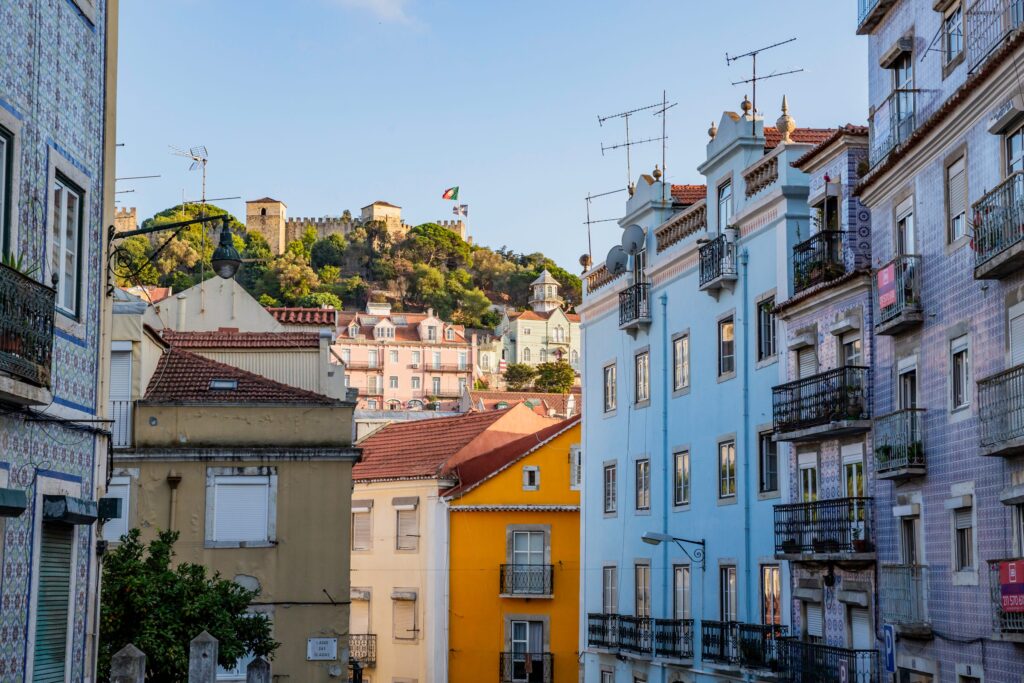- Kylie Adamec moved to Portugal in 2022 after struggling to get her career off the ground in the US.
- Once she started working for herself, she couldn't afford cities like Chicago or New York City.
- She took a chance on herself and moved to Portugal and it opened her eyes to new possibilities.
This as-told-to essay is based on a conversation with Kylie Adamec, 26, a real-estate consultant in Lisbon who moved from Chicago to Portugal in 2022. The conversation was edited for length and clarity.
I was on that path: finish high school, get a degree from a fancy university, and then go get a job, pay off debts, buy a house.
I hated it.
I had really tried to fit myself into that narrative of what a smart girl from a nice background like myself is supposed to do.
I'm from Colgate, a very small town in southeastern Wisconsin, right in between Milwaukee and Madison. The population's a couple thousand.
In the spring of 2019, I graduated college. I had a job lined up at a consulting firm in Toronto. I ended up losing that contract because, through networking, I didn't go through the same process as someone who just submitted an application normally. The higher-up people whom I spoke to initially weren't aware of rules the company had related to giving a Canadian visa to an entry-level or junior-level position.
I walked across the stage at graduation like, "Yes, I've got a job." A couple of weeks later, that was gone.
I ended up getting a job at a startup company in New York City in December of that same year, and I lost it once the pandemic happened.
It was just this cycle of being hopeless, digging my way out of it, and then, for forces and reasons out of my power, losing it.
I started a little online business doing search engine optimization — you can learn almost anything online these days, and I figured out how to do it. Eventually, I got a couple of paid clients and it grew from there.
Once the pandemic happened, I was like, "Go get a job. Go do your thing. Go make money and move on with your life." But it wasn't working out, and it was almost as if I was being given an opportunity to just say, "Screw this. I'm done."

It was a feeling of a fish out of water, not fitting in, feeling like there was no way I was ever going to be satisfied trying to fit myself into this storyline.
When I was in college, I did a study abroad program in Rome. At the time, I had a mentor who had a friend who could act as another mentor to me. If I ever moved to Europe permanently, he'd be a good person to know. When I was studying abroad, I made a trip to Portugal and I happened to meet this person — who's now my mentor. It was just savvy networking, I guess.
My mentor in Portugal has been in the real-estate business for generations. He said to me one day, "Why don't you move to Portugal? The cost of living is significantly cheaper. You have an online business — you can move here. It's becoming really popular for digital nomads, retirees, and North Americans in general."
After I did a little bit of research, I figured out it actually wasn't that difficult to get a visa with a US passport, and it was going to be a lot cheaper than if I went back to Chicago or New York. So I left.
The cheaper healthcare in Portugal was a big reason I moved
I wanted to go out into the world and make my next move, network more, and grow my business, but I couldn't believe how expensive life had gotten from early 2020 to 2021.
Even though I was doing really well, I couldn't justify the cost of living in Chicago or New York at that time.
On top of that, I got slapped with my first tax return as a self-employed person. I couldn't believe how much I owed in taxes. It felt like I had worked so hard and did the whole old-fashioned pull-yourself-up-by-the-bootstraps sort of thing, but I was paying an arm and a leg for my own private healthcare — and I owed this much money in taxes?
All the while, it seemed as if there were so many problems happening in local communities. I was like, "Where's all this money going to?" It wasn't clicking for me. I felt kind of betrayed.
Compared to living in the center of New York City or Chicago, you can save a considerable amount of money in the center of Portugal. If you live in a suburb of Tennessee or a suburb in Wisconsin, maybe you're going to end up paying the same amount in rent as you would in the middle of Lisbon.

I was paying 900 euros a month for a one-bedroom apartment in Lisbon when I first moved — which is a little over $1,000. In Chicago, it's like $1,500.
The biggest thing for me, though, is the healthcare situation.
I had a medical emergency when I was 23 years old, and I had a private healthcare plan in the United States. Being self-employed, I got slapped with a nearly $10,000 medical bill. I was shocked. I was like, "I have healthcare. Why am I paying $10,000 for this medical emergency? I should be covered."
I wasn't.
In Lisbon, I pay less than $50 a month for a private healthcare plan. I go to the doctor, and it's incredibly straightforward what I'm going to owe. I get the bill, pass it on to the insurance, and they cover it. When I see the bill for health insurance or going to the doctor, I feel the most pleasure day-to-day.
I probably won't be moving back to the US full-time
When I told people I was going to make the move, most of them were skeptical of it. Until recently, it wasn't very well known that you could live this life on your laptop, create new businesses, and make money.
I have two different companies, Camila Ana and Casa Azul. It sounds unsexy, but we facilitate the rental process for people looking to move to Portugal. We cater to people — mostly from the Americas — moving to Portugal, but we'll work with people from any country.
Honestly, I didn't move to Portugal thinking it was my forever home. I never thought, "This is it. I'm leaving and never coming back."
I thought I was going to go, try it out, and see what life brings to me. Once I got here, and now having lived here for almost two years, the only thing that has really changed is now I see so many more opportunities to try out so many more different countries — it's not just Portugal or the United States.
My eyes have been opened to see that there are even more options out there.
For me, Portugal is a great one. It's certainly not a perfect place, and there are a lot of challenges that come with moving here.
There's an analogy for how people socialize in the United States versus in Portugal. It describes people in the United States as peaches, and people in Portugal as coconuts.
In the United States, you can get in with someone and really become their friend very quickly — it's like penetrating a peach. It's very easy to get in, but then you have this hard core in the middle. It's like, you're never going to know absolutely everything. You're always going to have a little bit of a personal distance between you and that person.
In Portugal, people are like coconuts. It's very hard to get in. It's very difficult to become an insider with someone. But once you're in, you're in, and people will fight for you. A lot of times people come to the country and they think everyone's going to have their arms wide open and be like, "Hey, be our best friend. We love you, American. We love you, Canadian." It takes a lot of time.
Unfortunately, a lot of people don't actually try to assimilate themselves, learn the language, or do basic things to try to become a little bit more affiliated with the locals. They end up blaming the local people instead of themselves for feeling like outsiders forever.
You have to take the good with the bad, at least for most people. Do you want to deal with the good and the bad that comes in the United States, or the good and the bad in Portugal, or in Japan, or in Turkey?
If you have an extreme amount of means beyond what most normal people pay, maybe you can avoid those things, but I think for the average person who's looking to move abroad, it's a matter of picking your poison.
I'm planning on moving to Spain at the end of this year — or at least living 50-50 between Spain and Portugal.
Moving back to the United States permanently? No, I don't think so. I could see it as a part-time place, because I like to come back and see my family. I like to network there. I really like the business culture in Chicago and New York, but it certainly isn't my forever home.
I'd like to try out countries like Malaysia, Turkey, Belize, and El Salvador. There are a lot of places I'd like to go and see. We'll see where life takes me.
